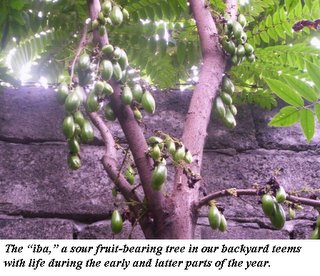No room for superstition
A couple of weeks ago while I was making our small backyard garden ready for transplanting some cabbage seedlings, a neighbor dropped by to talk about some concerns. In the course of our conversation, he mentioned that it's not good to keep any sour crops or sour fruit-bearing trees near the house or within your fence because it will bring you some sort of misfortune: sour relationships, unfavorable business, etc. I was a little surprised by the comment but I politely explained that it was not the case with the people I know.
 After that conversation, I had ample time to think about said neighbor's comment while I was piling the small rocks around the garden. And I remembered that my grandparents planted and sustained not one but two kinds of sour fruit-bearing trees in their backyard and both trees gained them more friends and provided them with opportunity to show forth their generosity. For example, the balimbing trees may be eaten raw (and children from school or from church would love to take some on their way home) and is also a great ingredient for soup. The biasong fruit (which belong to the lemon family) may also be eaten but it is loved for its sweet fragrance and its medicinal value for children and for pregnant women.
After that conversation, I had ample time to think about said neighbor's comment while I was piling the small rocks around the garden. And I remembered that my grandparents planted and sustained not one but two kinds of sour fruit-bearing trees in their backyard and both trees gained them more friends and provided them with opportunity to show forth their generosity. For example, the balimbing trees may be eaten raw (and children from school or from church would love to take some on their way home) and is also a great ingredient for soup. The biasong fruit (which belong to the lemon family) may also be eaten but it is loved for its sweet fragrance and its medicinal value for children and for pregnant women.I just don't know where the superstitious beliefs about these plants came from. But the experiences of my grandparents show that these beliefs are without basis and should not affect the way we act and think about things. Genesis, the first book of the Bible which details the account of creation tells us that everything that God made was "very good" (Genesis 1:31). Jeremiah (23:24) also tells us that God fills heaven and earth. Therefore, there is no room for anything that is unlike good such as these superstitious beliefs.
The Catechism of the Catholic Church explains why Christians should free themselves from any form of superstition in the following:
The Catechism of the Catholic Church explains why Christians should free themselves from any form of superstition in the following:
"Superstition is the deviation of religious feeling and of the practices this feeling imposes. It can even affect the worship we offer the true God, e.g., when one attributes an importance in some way magical to certain practices otherwise lawful or necessary..." (Paragraph 2111)
"Superstition is a departure from the worship that we give to the true God." (Paragraph 2138)
In the Philippine experience, although many such beliefs still occupy the thought of many Filipinos, it is nice to see that more and more people are recognizing the importance of living (not just reading) the Gospel. I love the way this experience is described in page 170 of the book Science and Health with Key to the Scriptures by Mary Baker Eddy. It says, "[t]he age seems ready to approach this subject, to ponder somewhat the supremacy of Spirit, and at least to touch the hem of Truth's garment." And, yes, we are all part of this unfolding - by living what we truly believe, by living the Gospel that we hear each Sunday in church and/or read in the comfort of our homes during the week. This is our way of taking part in the "great commission." I guess it's not very difficult to do and I know you'ld love to do it too.


0 Comments:
Post a Comment
<< Home